Meena Kumari
Meena Kumari[1] (born Mahjabeen Bano; 1 August 1933[2] – 31 March 1972) was an Indian film actress and poet, who worked in Hindi films. Popularly known as The Tragedy Queen[3][4] She was active between 1939 and 1972. [5][6] Kumari was described by critics as a "historically incomparable" actress of Hindi cinema.[7] In a career spanning 33 years, she starred in about 92 films such as Sahib Bibi Aur Ghulam, Pakeezah, Mere Apne, Aarti, Baiju Bawra, Parineeta, Dil Apna Aur Preet Parai, Foot Path, Dil Ek Mandir and Kaajal.
Meena Kumari | |
|---|---|
.jpg) Meena Kumari in Chand (1959) | |
| Born | Mahjabeen Bano 1 August 1933 |
| Died | 31 March 1972 (aged 38) Mumbai, Maharashtra, India |
| Burial place | Rahmatabad cemetery, Mumbai, Maharashtra |
| Nationality | Indian |
| Other names | Tragedy Queen, Manju, Meenaji, Chinese Doll, Female Guru Dutt, Cinderella of Indian films |
| Occupation |
|
| Years active | 1939–1972 |
Works | Full list |
| Spouse(s) | |
| Relatives | See Ali-Amrohi family |
| Awards | See List |
| Musical career | |
| Genres | |
| Years active | 1941, 1946–1948, 1959–1972 |
| Associated acts | |
| Writing career | |
| Pen name | Naaz |
| Signature | |
 | |
Meena Kumari won four Filmfare Awards in the Best Actress category. She was the recipient of the inaugural Filmfare Best Actress Award for Baiju Bawra in 1954 and had a consecutive win in the second Filmfare Awards (1955) for Parineeta. Kumari made history at the 10th Filmfare Awards (1963), by receiving all three of the Best Actress nominations, and won for her performance in Sahib Bibi Aur Ghulam.[8] In the 13th Filmfare Awards (1966), Kumari won her last Best Actress award for Kaajal. Critics often noted that her character in Sahib Bibi Aur Ghulam was similar to her own real-life story.
Family background
Meena Kumari's father was a Sunni Muslim named Master Ali Bux who had migrated from Bhera (now in Punjab province of Pakistan).[9] He was a veteran of Parsi theater, played harmonium, taught music, wrote Urdu poetry, played small roles in films such as Eid Ka Chand and composed music for films like Shahi Lutere.[9] Meena Kumari's mother Iqbal Begum, whose original name was Prabhawati Devi, was a Bengali Christian converted to Islam. Iqbal Begum was the second wife of Ali Bux.[9] Before meeting and then marrying Ali Bux, she was a stage actress and dancer under the stage name "Kamini" and was related to the well known Tagore family of Bengal.[9]
Connection with Tagore family
Meena Kumari's grandmother, Hem Sundari Tagore was the daughter of Rabindranath Tagore's younger brother.[10] After the death of her husband, being forced by his family, she left for Meerut, became a nurse, married a Christian named Pyare Lal Shakir Meeruti (1880–1956) who was an Urdu journalist and embraced Christianity.[11] Hem Sundari had two daughters; one of them was Prabhawati, Meena Kumari's mother.[7]
Birth and childhood
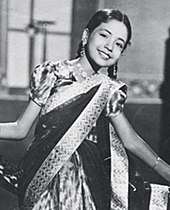
Meena Kumari was born with the name Mahjabeen in a family of poor theatre artists, Ali Bux and Iqbal Begum on 1 August 1933.[2] This was a great disappointment to Ali Bux because he wanted a son.[7] Meena Kumari was the second daughter of Ali Bux and Iqbal Begum.[7] Khursheed Jr (not the singer-actress Khursheed Bano) was her elder sister and Mahliqa (also known as Madhu, first married to actor Mehmood Ali) was her younger sister. Madhu was also a well known child artist by the name Baby Madhuri.[7] At home, Mahjabeen's family called her by the name "Munna".[12] Her family could not afford to pay the doctor for her delivery, so her father decided to leave her at an orphanage. He changed his mind a few hours later and fetched her home.[13][14] Mahjabeen said as a child that she was not interested in a film career, and would rather attend school.[15] In spite of this, her parents started peddling young Mahjabeen to film studios for work opportunities. Director Vijay Bhatt cast her in the film Leatherface and on her first day she was paid Rs. 25.
Leatherface was released in 1939.[16] She became the breadwinner in the Bux family at a very young age. In an interview given in 1962, Meena Kumari explained that the fact she had been supporting her parents from the age of four gave her immense satisfaction.[7] Mahjabeen was admitted into a regular school, but that was not for long, because the demands of work frequently interrupted her curricula. She never went to school in any meaningful sense, and her education was the result of private tuitions, and more significantly the result of individual interest; in every sense she was self-educated. Kumari concentrated most on Urdu although she could get by in English and Hindi.[7] She was nicknamed "Reading Mahjabeen", as she brought books onto the sets and when working on location.[7]
Career
Early work as Baby Meena (1939–45)
.jpg)
Meena Kumari began acting when she was four. She initially worked mostly in Vijay Bhatt productions; Leatherface (1939), Adhuri Kahani (1939), Pooja (1940) and Ek Hi Bhool (1940). Vijay Bhatt rechristened Mahjabeen as "Baby Meena" during the filming of Ek Hi Bhool (1940).[17]
More films followed for baby Meena, namely Nai Roshni (1941), Kasauti (1941), Vijay (1942), Garib (1942), Pratiggya (1943) and Lal Haveli (1944). The 1941 film Bahen was directed by Mehboob Khan and is the only successful collaboration between the actress and the director. Although thirteen years later Khan did cast her in Amar but she eventually left the shooting after few days passing her role to Madhubala. After this, both of them never worked together.
Early career (1946–52)
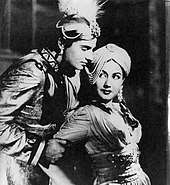
Meena was cast under the name Meena Kumari in Ramnik Production's Bachchon Ka Khel (1946). One of the major blows in Kumari's life was the death of her mother, Iqbal Begum, who died merely 18 months after the family's arrival at their new house in Bandra. She had lung cancer and died on 25 March 1947. Duniya Ek Sarai (1946), Piya Ghar Aaja (earlier titled Jalan) (1948) and Bichchade Balam (1948) were some of her early films in which she not only acted but also sang songs. By the late 1940s, she shifted her focus to films belonging to either mythology or fantasy genres. Veer Ghatotkach (1949), Shri Ganesh Mahima (1950), Laxmi Narayan (1951), Hanuman Patal Vijay (1951) and Aladdin Aur Jadui Chirag (1952) performed with credit. Other films such as Magroor (1950), Hamara Ghar (1950), Sanam (1951), Madhosh (1951), and Tamasha (1952) had Kumari either in multi-starrers or in lead roles which unfortunately failed to leave a lasting impact on the audience. Meena Kumari desperately needed a film which would have transformed her into a sensation among the audience and she soon got one – it was her mentor Vijay Bhatt's musical, Baiju Bawra (1952).
Rising star (1952–56)
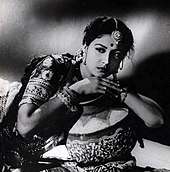
- 1952: Baiju Bawra – Kumari played the female lead in the film. In the climax of the film, the two lead characters were to drown in the river. While shooting this scene, Kumari actually almost drowned but was ultimately rescued.[18] A series of incidents ranging from Hindustan Lever securing rising star Meena Kumari as a model for their products to being featured on the calendar of a popular franchise took place after the success of Baiju Bawra.
- 1953: Parineeta – Directed by Bimal Roy, (starring Ashok Kumar and Meena Kumari as leads) the film won Kumari second Filmfare Best Actress Award. It was based upon the 1914 Bengali novel by Sharat Chandra Chattopadhyay and this version of the film is considered to be the most faithful adaptation of the novella, particularly due to Meena Kumari's interpretation of the role of Lalita. After the success of Parineeta, Bimal Roy was very much keen to cast Kumari in his next venture titled Devdas in the role of Paaro. However, things with Kamal Amrohi never materialised and the audience lost the golden opportunity to see Kumari essaying the iconic role of Paaro in the film. Do Bigha Zamin – directed by Bimal Roy, won the International Prize at Cannes in 1954, the first Indian film to do so. This film also marks the maiden guest appearance of Meena Kumari in a career spanning 33 years. Foot Path – directed by Zia Sarhadi, was Meena's first film with Dilip Kumar. This movie was featured in Avijit Ghosh's book, 40 Retakes: Bollywood Classics You May Have Missed. Daaera – was written and directed by Kamal Amrohi, starring Meena Kumari, Nasir Khan and Nana Palsikar in lead roles.[19] Other films included Naulakha Haar and Daana Paani.
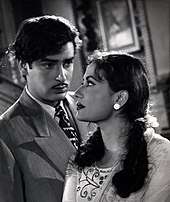
- 1954: Chandni Chowk – directed by B. R. Chopra in 1954, a classic Muslim social drama film,[20] was Chopra's second directorial venture and another success at the box office. Baadbaan- directed by Phani Majumdar, had a star cast of Meena Kumari, Dev Anand, Ashok Kumar and Usha Kiran. Ilzaam – directed by R C Talwar, starring Meena Kumari and Kishore Kumar, also premiered.
- 1955: In Azaad, directed by Sriramulu Naidu S.M. Meena Kumari pranced gaily with Robinhood Dilip Kumar. It was the top grossing Hindi film that year[21] and included hit song "Aplam Chaplam" sung by Lata Mangeshkar and Usha Mangeshkar. Adl-e-Jehangir – was a Hindi language historical drama film directed by G.P. Sippy, and it became a commercial success at the box office.[22]Bandish - directed by Satyen Bose starring Meena Kumari, Ashok Kumar, and Daisy Irani was a box office hit. Rukhsana - was directed by R.C. Talwar and starred Meena Kumari and Kishore Kumar.
- 1956: Ek Hi Raasta – was a film based on the issue of widow remarriage, directed and produced by B. R. Chopra. It starred Meena Kumari with newcomer Sunil Dutt, Ashok Kumar and Daisy Irani. The film proved to be successful at the box office and was screened for more than 25 weeks, which was a "Jubilee Hit".[23] Bandhan - directed by Hemchandra Chunder, based on the popular Bengali novel Mantra Shakti, starred Meena Kumari and Pradeep Kumar as leads and was awarded with a Certificate of Merit in National Film Awards. Mem Sahib – directed by R.C. Talwar, featured Meena Kumari for the first time with Shammi Kapoor. The modern avatar of Meena Kumari was well received by audiences and the film became a box office hit. Naya Andaz – directed by K. Amarnath, starring Meena Kumari and Kishore Kumar in lead roles, was a musical hit. Halaku – a historical Hindi movie directed by D.D. Kashyap included Meena Kumari, Pran, Minoo Mumtaz, Raj Mehra and Helen. It was one of the box office hits and celebrated a silver jubilee.
Tragedy Queen of Indian Cinema (1957)
_cropped_on_Meena_Kumari.jpg)
- 1957: Sharada – directed by L.V. Prasad, was Meena Kumari's first venture with Raj Kapoor. A difficult role to essay, it was refused by all leading actresses of the day until Meena Kumari finally agreed. She won best actress at Bengal Film Journalists' Association Award for her work. The film gained great critical success. The film was the ninth highest grossing film at the Indian Box Office in 1957 and was noted as one of her best performances.[24] Miss Mary – a comedy film directed by L.V. Prasad, starred Meena Kumari and Gemini Ganesan. The film was one of the biggest hits of that year.[25]
- 1958: For Sahara – directed by Lekhraj Bhakri, Meena Kumari received a Filmfare nomination. Yahudi, directed by Bimal Roy starred Meena Kumari, Dilip Kumar, Sohrab Modi, Nazir Hussain and Nigar Sultana. It was based on the play Yahudi Ki Ladki by Agha Hashar Kashmiri, a classic in Parsi – Urdu theatre, about persecution of Jews in the Roman Empire.[20] The film was a box office hit with the famous song "Yeh Mera Diwanapan Hai" sung by Mukesh. Farishta – starred Ashok Kumar and Meena Kumari as protagonists. The film was rated as above average. Savera – was directed by Satyen Bose, with Meena Kumari and Ashok Kumar in lead roles.
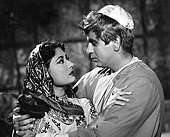
- 1959: Chirag Kahan Roshni Kahan, directed and produced by Devendra Goel, stars Meena Kumari with Rajendra Kumar and Honey Irani. The film was a huge hit at the box office and Meena Kumari received a Filmfare nomination for her performance in the Best Actress category . Char Dil Char Rahen – was directed by Khwaja Ahmad Abbas, with star cast Meena Kumari, Raj Kapoor, Shammi Kapoor, Kumkum and Nimmi. The film received warm reviews from critics. Shararat – was a 1959 romantic drama film written and directed by Harnam Singh Rawail, starring Meena Kumari, Kishore Kumar, Raaj Kumar and Kumkum in lead roles, with the memorable song "Hum Matwaley Naujawan" sung by Kishore Kumar. Film Chand directed by Lekhraj Bhakri focused on the effects of polygamy prior to The Hindu Marriage Act, 1955. The film stars Kumari with Balraj Sahni, Pandari Bai and newcomer Manoj Kumar in lead roles. Her other films released in 1959 were Ardhangini, Satta Bazaar, Madhu and Jagir.
- 1960: Dil Apna Aur Preet Parai was a Hindi romantic drama written and directed by Kishore Sahu. The film starred Meena Kumari, Raaj Kumar and Nadira as leads. The film narrates the story of a surgeon who is obligated to marry the daughter of a family friend, while he is in love with a colleague nurse, played by Meena Kumari. It is one of her noted acting performances.[26] The film's music is by Shankar Jaikishan, and features hit song, the Hawaiian-themed "Ajeeb Dastan Hai Yeh" sung by Lata Mangeshkar. At the 1961 Filmfare Awards it created an upset by beating the popular musical epic Mughal-e-Azam of Naushad for the Best Music Director category.[27]Bahana – directed by Kumar, had a star cast inclusive of Meena Kumari, Sajjan, Mehmood, Helen, Pramila, Sulochana Latkar and Sheela Vaz. Kohinoor – directed by S. U. Sunny featured Meena Kumari, Dilip Kumar, Leela Chitnis and Kumkum. A film of lighter tone, it lacked the intense characterisations of earlier films of both Dilip Kumar and Meena Kumari, who are otherwise known as the Tragedy King and Tragedy Queen respectively.
- 1961: Bhabhi Ki Chudiyan was a family drama directed by Sadashiv J. Row Kavi with Meena Kumari and Balraj Sahni in the lead roles. The film was one of the highest-grossing films of the year at the Indian box office with the famous song "Jyoti Kalash Chhalke" by Lata Mangeshkar. Zindagi aur Khwab – directed S. Bannerjee, starring Meena Kumari and Rajendra Kumar, was a hit at the Indian box office. Pyaar Ka Saagar – was directed by Devendra Goel with Meena Kumari and Rajendra Kumar.
Critical acclaim (1962)
- Sahib Bibi Aur Ghulam
Sahib Bibi Aur Ghulam, a film produced by Guru Dutt and directed by Abrar Alvi featured Meena Kumari in the iconic role of Chhoti Bahu. It is based on the Bengali novel "Saheb Bibi Golam" by Bimal Mitra. The film stars Meena Kumari, Guru Dutt, Rehman, Waheeda Rehman and Nazir Hussain.[28] Its music is by Hemant Kumar and the lyrics are by Shakeel Badayuni. The film is also noted for its brilliant cinematography by V. K. Murthy and the famous songs "Na Jao Saiyaan Chhuda Ke Baiyan" and "Piya Aiso Jiya Mein" sung by Geeta Dutt.
In Sahib Bibi Aur Ghulam Kumari played the character of Chhoti Bahu. For Sahib Bibi Aur Ghulam, to support a drooping heavy look which is associated with immoderate consumption of liquor, she used to apply concentrated Eau de Cologne under her nose. The irritation caused by such action helped her in achieving the perfect look for the role of an alcoholic.
The film won four Filmfare Awards, including the Best Actress award. This movie was nominated for the Golden Bear at the 13th Berlin International Film Festival, where Meena Kumari was selected as a delegate. Sahib Bibi Aur Ghulam was chosen as India's official entry to the Oscars.[29]
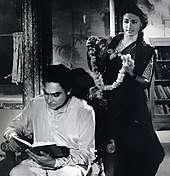
- 1962: Aarti, directed by Phani Majumdar, stars Meena Kumari in the title role of Aarti, with Ashok Kumar, Pradeep Kumar and Shashikala appearing in pivotal roles. Kumari won a Best Actress award for this film from the Bengal Film Journalists' Association. Main Chup Rahungi – directed by A. Bhimsingh with Meena Kumari and Sunil Dutt in lead roles was one of the biggest hits of the year and Meena Kumari received a Filmfare nomination for Best Actress for her performance.
- 1963: Dil Ek Mandir, directed by C. V. Sridhar, stars Meena Kumari, Rajendra Kumar, Raaj Kumar and Mehmood. The film's music is by Shankar Jaikishan. It was a big hit at the box office and so was its music which includes famous songs like "Hum Tere Pyar Mein Sara Alam" and "Yaad Na Jaaye", sung by Lata Mangeshkar and Mohammed Rafi respectively. Akeli Mat Jaiyo – directed by Nandlal Jaswantlal, is a romantic comedy with Meena Kumari and Rajendra Kumar. Kinare Kinare was directed by Chetan Anand with Meena Kumari, Dev Anand and Chetan Anand in lead roles.
- 1964: Sanjh Aur Savera – is a romantic drama film directed by Hrishikesh Mukherjee,[30] starring Meena Kumari, Guru Dutt and Mehmood. This film marked the final appearance of Guru Dutt at the silver screen, who died later in the year of its release. Benazir – was a Muslim social film directed by S. Khalil, starring Meena Kumari, Ashok Kumar, Shashi Kapoor and Tanuja. Chitralekha directed by Kidar Sharma, starring Meena Kumari, Ashok Kumar and Pradeep Kumar, was based on the 1934 Hindi novel by the same name by Bhagwati Charan Verma, about Bijgupta serving under the Maurya Empire, and king Chandragupta Maurya (340 BCE–298 BCE) and his love for courtesan Chitralekha.[31] the film's music and lyrics were by Roshan and Sahir Ludhianvi and noted for songs such as "Sansaar Se Bhaage Phirte Ho" and "Mann Re Tu Kaahe".[32][33] Gazal featuring Meena Kumari and Sunil Dutt, was a Muslim social film about the right of young generation to the marriage of their choice. It had music by Madan Mohan. Ved Rahi and Madan Sinha (as Ved-Madan) directed and produced the film. The lyrics of the songs were written by Sahir Ludhianvi, featuring notable filmi-ghazals such as "Rang Aur Noor Ki Baraat", sung by Mohammed Rafi and "Naghma O Sher Ki Saugaat" by Lata Mangeshkar.[34][35] Main Bhi Ladki Hoon was directed by A. C. Tirulokchandar. The film stars Meena Kumari with newcomer Dharmendra.
- 1965: Kaajal directed by Ram Maheshwari, stars Meena Kumari, Dharmendra, Raaj Kumar, Padmini, Helen, Mehmood and Mumtaz. The film was listed in the Top 20 films of 1965.[36] Meena Kumari won her fourth and last Filmfare award for Kaajal. The film was originally based on the novel "Maadhavi" by Gulshan Nanda. Bheegi Raat, directed by Kalidas, with Meena Kumari, Ashok Kumar and Pradeep Kumar in lead roles was one of the biggest hits of the year with the famous song "Dil Jo Na Ke Saka" sung by Lata Mangeshkar and Mohammad Rafi in two different versions. The film Purnima, directed by Narendra Suri, featured Meena Kumari and Dharmendra in lead roles.
- 1966: Phool Aur Patthar, directed by O. P. Ralhan, starred Meena Kumari and Dharmendra in lead roles. This movie went on to become a golden jubilee hit, catapulting Dharmendra to stardom and was the highest-grossing movie of the year.[37] Meena Kumari's performance in the film ensured her a nomination in the Best Actress category in the Filmfare awards for that year. The film Pinjre Ke Panchhi was directed by Salil Choudhury, with Meena Kumari, Balraj Sahni and Mehmood in main roles.
- 1967: Majhli Didi was directed by Hrishikesh Mukherjee and stars Meena Kumari along with Dharmendra.[38] The film was India's entry to the 41st Academy Awards for Best Foreign Language Film.[29] The film Bahu Begum was directed by M. Sadiq, starring Meena Kumari, Pradeep Kumar and Ashok Kumar. The film has music by Roshan and lyrics by Sahir Ludhianvi and is known for the songs "Hum Intezar Karenge", sung by Asha Bhosle and Mohammed Rafi and "Duniya Kare Sawal" by Lata Mangeshkar.[39] Noor Jehan, directed by Mohammed Sadiq, was a historical film starring Meena Kumari and Pradeep Kumar, with Helen and Johnny Walker in minor roles. It dramatised the epic love story of Empress Nur Jehan and her husband, the Mughal Emperor Jehangir. The film Chandan Ka Palna was directed by Ismail Memon, starring Meena Kumari and Dharmendra. After the Eclipse, a 37 minutes color documentary directed by S. Sukhdev and shot in the suburbs of Varanasi featured Meena Kumari's voice along with the voice of actor Shashi Kapoor.
- 1968: Baharon Ki Manzil a Suspense Thriller, directed by Yakub Hassan Rizvi, stars Meena Kumari, Dharmendra, Rehman and Farida Jalal. The film was one of the major hits of the year. The film Abhilasha was directed by Amit Bose. The cast includes Meena Kumari, Sanjay Khan and Nanda.
By the early 70s, Meena Kumari eventually shifted her focus on more 'acting oriented' or character roles. Out of her last six releases namely Jawab, Saat Phere, Mere Apne, Dushman, Pakeezah & Gomti Ke Kinare, she only had a lead role in Pakeezah. In Mere Apne and Gomti Ke Kinare, although she didn't play a typical heroine role, yet her role was actually the central character of the story.
- 1970: Jawab was directed by Ramanna, starring Meena Kumari, Jeetendra, Leena Chandavarkar and Ashok Kumar. Saat Phere was directed by Sundar Dhar, with Meena Kumari, Pradeep Kumar and Mukri in pivotal roles.[40]
- 1971: Mere Apne written and directed by Gulzar, was his first directorial venture. The film stars Meena Kumari, Vinod Khanna and Shatrughan Sinha in lead roles along with Deven Verma, Paintal, Asit Sen, Asrani, Danny Denzongpa, Keshto Mukherjee, A. K. Hangal, Dinesh Thakur, Mehmood and Yogeeta Bali. Dushman, directed by Dulal Guha, stars Meena Kumari, Rehman and Rajesh Khanna with Mumtaz in lead roles. The film became a "super-hit" at the box office.
- 1972: Gomti Ke Kinare directed by Saawan Kumar Tak, in his directorial debut, stars Meena Kumari, Sanjay Khan and Mumtaz. Gomti Ke Kinare was released on 22 November 1972, after Meena Kumari's demise and was touted as a tribute to her.
Completion of Pakeezah (1958–72)
In 1954, during the shooting of Azaad, Meena Kumari and Kamal Amrohi were in South India, and here Kamal Amrohi began outlining the plot of his next film with his wife and decided to call it Pakeezah. Meena Kumari was determined to complete the film and, well aware of the limited time left for her to live, went out of her way to complete it at the earliest. Despite her rapidly deteriorating health, she gave the finishing touches to her performance.
Pakeezah had a grand premiere on 3 February 1972, at Maratha Mandir theatre, in central Mumbai, and the prints being carried on a decked-up palanquin.[7] Meena Kumari sat next to Kamal Amrohi during the premiere.[7] When Mohammed Zahur Khayyam complimented Meena Kumari with "Shahkar ban gaya" (it's priceless), she was in tears.[41] After watching the whole film, Kumari told a friend that she was convinced that her husband was the finest film-maker in India.[7] The film finally released the following day, 4 February 1972. Pakeezah enjoyed a successful run of 33 weeks and even celebrated its silver jubilee. She posthumously received her twelfth and last Filmfare nomination for Pakeezah. Bengal Film Journalists' Association Awards bestowed the Special award to Meena Kumari for Pakeezah in 1973.
Career as a Playback Singer
Meena Kumari was also a playback singer. She sung as a child artist for films like Bahen till 1945. As a heroine, she rendered her voice to songs from films like Duniya Ek Sarai (1946), Piya Ghar Aaja (1948), Bichchade Balam (1948)[42] and Pinjre Ke Panchhi (1966). She also sung for Pakeezah (1972), however, the song was not used in the film and was later released in the album Pakeezah-Rang Ba Rang (1977).
Personal life
Marriage to Kamal Amrohi (1952)
It was in the year 1938, when a young and upcoming writer Kamal Amrohi was searching a girl for a small role in Sohrab Modi's film Jailor. On someone's suggestion he was sent to Ali Bux's house where he was greeted by a 5-year-old girl who had traces of mashed bananas around her face. The young girl was however not selected for the part but little did Amrohi knew that she was to become the love of his life. This girl was Meena Kumari who was then popular as Baby Mahjabeen.[7]
Years later, on the sets of Tamasha, Ashok Kumar introduced filmmaker Kamal Amrohi to Meena Kumari,[7] who later, offered her a lead role in his upcoming film Anarkali. The contract was signed on 13 March 1951 but on 21 May 1951, Meena Kumari was involved in a motor car accident while returning from Mahabaleshwar to Bombay.[7] She was admitted to Sassoon Hospital in Poona, injured around the left hand. Kumari went through bouts of depression, and Kamal Amrohi visited her regularly during her days in the hospital.[7] When they were not scheduled to meet, both Kumari and Amrohi would write letters to each other.[7]
For four months this hospital affair continued and love blossomed. This accident left Meena Kumari with a banded left pinky which remained banded throughout her life, and she used to cover her left hand with a dupatta or saree during shoots.[7] After Kumari was discharged from hospital, a telephoning marathon between her and Amrohi began during nights.[7] Soon shooting of the film Anarkali commenced but the producer suffered a financial disaster and the film was abandoned. On 14 February 1952, Meena Kumari, 18, and Kamal Amrohi, 34, secretly got married in a simple "Niqah" ceremony in the presence of a Qadi and Kumari's younger sister, Mahliqa (Madhu).[7] The Niqah paper was witnessed by Baqar Ali (Kamal Amrohi's friend and assistant) and Qadi's two sons, and signed in the name of Mahjabeen Bano (Meena Kumari's real name) and Syed Ameen Haider (Kamal Amrohi's real name). After the ceremony, the newlyweds parted. Amrohi left for Sion and Meena and Madhu returned home.[7] The marriage was kept secret from the family and media, although Kamal Amrohi was already married and had three children from his previous wife. After some months, the matrimony news was leaked to Kumari's father, Ali Bux, by a cook who overheard their midnight phone conversations. The father recommended a divorce.[7] Meena Kumari remained adamant on her decision, but stayed in her father's house. Meanwhile, Kamal Amrohi planned a film called Daaera in 1953 and decided to cast Kumari, now his wife, in it.[7] Kumari asked her father's permission for working in the film, but Ali Bux refused on the basis that the dates were given to Mehboob Khan for the film Amar.[7] She protested, but he warned his daughter that if she went to shoot for Daaera the doors of his house would be permanently shut for her.[7] Reluctantly, Meena Kumari agreed, but after shooting for five days, she instigated a disagreement with Mehboob Khan and left the studios.[7] On 14 August 1953, Meena Kumari drove to Bombay Talkies and worked in front of her husband's camera for the film Daaera. Ali Bux somehow came to know this by some external sources and at night, on her return, he refused to open the door. Meena Kumari turned her car around and left for her husband's residence at Sion.[7]
Separation from husband and addiction to alcohol (1964)
After their marriage, Kamal Amrohi allowed Meena Kumari to continue her acting career, but on the conditions that she should not remit anyone in her makeup room but her makeup artist and return home in her own car by 6:30 every evening.[7] Meena Kumari agreed to all terms, but with passing time she kept breaking them.[43] Abrar Alvi, director of Sahib Bibi Aur Ghulam, recounts how Kamal Amrohi would have his spy and right-hand man Baqar Ali present even in the makeup room while Meena's makeup was being done, and one evening, when working beyond schedule to complete a shot, he had to face his heroine dissolving in tears.[30]
In 1963, Sahib Bibi Aur Ghulam was selected as the Indian entry to the Berlin Film Festival and Meena Kumari was selected as a delegate. The then Minister of Information & Broadcasting, Satya Narayan Sinha, arranged for two tickets, one for Meena Kumari and one for her husband, but Kamal Amrohi refused to accompany his wife. The Berlin trip never materialized.[7] During a premiere at Eros cinema, Sohrab Modi introduced Meena Kumari and Kamal Amrohi to the governor of Maharashtra. Sohrab Modi said "This is the renowned actress Meena Kumari, and this is her husband Kamal Amrohi". Whereupon before greetings were exchanged, Kamal Amrohi interjected: "No, I am Kamal Amrohi and this is my wife, the renowned actress Meena Kumari". Saying this, Kamal Amrohi left the auditorium. Meena Kumari saw the premiere alone.[7]
According to Vinod Mehta, writer of her biography, Meena Kumari was subjected to physical abuse in her marriage. He points out that although Amrohi, repeatedly denied any such allegations, he learnt it from six different sources that she indeed was a sufferer.[7] After her death in 1972, fellow actress Nargis wrote a piece about her which was published in an Urdu magazine. She mentioned that while on an outdoor shoot of Main Chup Rahungi, when both of them were sharing adjacent rooms, she too heard noises suggestive of violence. The following day, she met a swollen-eyed Kumari who would have cried all night.[44] Such rumours found their base on the mahurat of Pinjre Ke Panchhi. On 5 March 1964, Kamal Amrohi's assistant, Baqar Ali slapped Meena Kumari when she allowed Gulzar enter her makeup room.[45] Kumari immediately called Amrohi to come to the film's set but he never came. Instead, he asked her to come to him, so he can decide what to do further.[44] This not only enraged Kumari but also acted as the final straw in their already strained relationship. Kumari went straightaway to her sister, Madhu's home. When Kamal Amrohi went there to bring her back, she refused to talk to him even after his repeated persuasion. After that, neither Amrohi tried to fetch her back nor Meena Kumari returned.[7] In an interview given to Tabassum on her show Phool Khile Hain Gulshan Gulshan after Kumari's death, Amrohi recalled her as "a good actress but not a good wife, who thought herself as an actress at home as well."[46]
Meena Kumari was a patient of chronic insomnia and was on sleeping pills for a long time since the days of telephoning conversations with Kamal Amrohi. During 1963, Dr. Saeed Timurza, her physician, then prescribed a small peg of brandy as a sleeping pill alternative and this was officially how she came into contact with the habit that was to kill her.[7] Somehow this prescribed peg of brandy turned into heavy drinking after her separation from her husband in 1964.[47] After that, Kumari's name was associated with Rahul, Gulzar, Dharmendra and Sawan Kumar Tak.[7]
Deteriorating health and treatment in London (1968)
In 1968, Kumari was diagnosed with cirrhosis of liver. The medical advice was that she needed more advanced and permanent cure.[7] She received treatments in London and Switzerland in June 1968. From the months of June to August, Meena Kumari was in the hands of Dr. Sheila Sherlock.[7]
Upon recovery, Kumari returned to India in September 1968 and on the fifth day after her arrival, Meena Kumari, contrary to doctors' instructions resumed work.[7] Suffering from cirrhosis of the liver, although Meena Kumari temporarily recovered but was now much weak and thin. Director Saawan Kumar Tak said "Not only did she not drink, she would not let me drink either. she did not touch a drop after London".[7] After returning from London, Kumari for the first time, purchased her own home, which was on the eleventh floor of a building called "Landmark", situated at Carter Road, Bandra.
Last days and death

Three weeks after the release of Pakeezah, Meena Kumari became seriously ill. On 28 March 1972, she was admitted to St Elizabeth's Nursing Home.[45]
She went into coma two days later and died shortly afterwards on 31 March 1972. She was 38 years old. The cause of her death was determined to be liver cirrhosis. As per her husband's wish, she was buried at Rehmatabad Cemetery, located at Narialwadi, Mazagaon, Mumbai.[45] Kumari requested the following prose for her tombstone: "She ended life with a broken fiddle, with a broken song, with a broken heart, but not a single regret."[45] As per his wish, upon his death on 11 February 1993 in Mumbai, her husband was buried next to her.
The poet Naaz
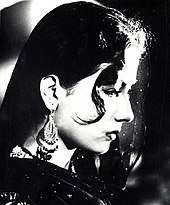
Meena Kumari was an Urdu poet under the pseudonym Naaz.[48] Historian critic Philip Bounds and researcher Daisy Hasan write regarding Meena Kumari's poetry: "Poetry was the medium through which Kumari distanced herself from her public image and criticized the industry that had brought her to public attention in the first place. In that sense, her poems tell us as much about Bollywood as they do about herself."[49]
- I write, I recite – an album consisting of Meena Kumari's poems under the label of LP Vinyl Record was released in 1971, for which Mohammed Zahur Khayyam gave music.[50] The poetry in the album (nazms) has been written, recited and sung by the poet herself.[51] The album was re-released on 19 September 2006.
- Tanha Chand (Lonely Moon), a collection of Meena Kumari's poems, was compiled by Gulzar and published after her death in 1972.[52]
- Meena Kumari, the Poet: A Life Beyond Cinema consisting of the late actress's poems and nazms was also published in 2014.
Legacy
—Khwaja Ahmad Abbas on Meena Kumari (Meena Kumari The Classic Biography)
Meena Kumari herself once said that people picked strands of her hair to make a taweez (talisman) out of it.[7][53] She never used products like glycerin to shed tears, but always shed her genuine ones while acting.[7] At the peak of her career, Meena Kumari was the highest-paid actress of her generation, and was the first to buy an Impala car.[54] Indian Film Critic Bhawana Somaaya says: "There was a time when top heroes were not willing to work with Meena Kumari, because she played the powerful roles". Vinod Mehta shares: "Meena Kumari became so powerful that she would make or break stars, Kumari adopted an attitude of guardian, artistic mentor towards the newcomers who worked opposite her like Rajendra Kumar in Chirag Kahan Roshni Kahan and with Sunil Dutt in Ek Hi Raasta."[7] Meena Kumari helped Dharmendra enormously in the initial stages of his career, and established Dharmendra's acting career in Indian Cinema.[7] The legendary Kathak master Pandit Lachhu Maharaj praised Meena Kumari's dancing skills and remarked on the unique way in which she would take a turn. He said, "The way in which she would turn, the angles of her shoulders, come naturally to her and cannot be taught."[55] Ashok Kumar said: "Meena was a natural actress. She was very choosy, but once she accepted a role, she put her heart into it and it's not surprising that she's still remembered for her sensitive portrayals. Sometimes when saying a dialogue I'd add a line not in the script and even as I worried about how Meena would react, she'd surprise me with just the right response."[56]
In 1953, soon after the success of Baiju Bawra, Kumari appeared in Dream House, an advertisement by Dunlopillo UK along with Ashok Kumar.[57] Kumari was a regular face to be featured on various film magazines and beauty soaps throughout her career. Her step-son recalls that Meena Kumari was an avid reader of novels by Agatha Christie and always used to keep mogra flowers by her bed before she slept.[58] The makers of film Jahan Ara (1964) had approached Kumari to play the role of Jahan Ara Begum. It was the time when Kumari was doing films which were commercially successful and critically acclaimed. Meena Kumari passed on this role to her friend, actress Mala Sinha. This film not only helmed her appreciation from critics but also resulted in a nomination in the Best Actress Category at the 12th Filmfare Awards.
Meena Kumari's most awaited film Pakeezah was released on 4 February 1972.[7] Tajdar Amrohi shares: "When the shooting of Pakeezah started again in 1969, the first song shot was "Mausam Hai Ashiqaana". With this song, Meena Kumari set a new fashion trend of girls wearing Lungi.[59] Indian Film Critic Bhawana Somaaya says: "Pakeezah is just like poetry on celluloid, I cannot imagine anybody else in this movie except Meena Kumari."[59]
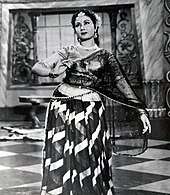
On 24 February 2016, Meena Kumari's original publicity material and memorabilia, including paintings and portraits of her films, were displayed at the Womanhood Festival at Osianama Liberty, Mumbai, India.[60]
Meena Kumari was among the front-runners in terms of setting fashion trends which are still in high demand.[61] Javed Akhtar points out that women in the 50s used to follow her sober and dignified fashion trends ranging from the hair bun to the traditional bindi.[62] Director Sanjay Leela Bhansali has often gone on record to appreciate the aesthetics of Pakeezah and the way Meena Kumari played the role with grace and beauty. Her floral or traditional Banarasi silk and Kanjeevaram saris can never go out of fashion and continue to be a favourite of ace designers like Sabyasachi Mukherjee.[63]
Due to the contrast between her stardom and troubled private life, Kumari is closely linked to broader discussions about modern phenomena such as mass media, fame, and consumer culture.[64] Every year, on Meena Kumari's birthday, numerous articles are printed and television programmes aired to commemorate her, and modern magazines continue to publish stories on her personal life and career.[65]
Vinod Mehta (writer of Meena Kumari – The Classic Biography) was told by a director: "Even Dilip Kumar (the tragedy king) found it difficult to keep his calm in front of her".[66] Raaj Kumar would often forget his dialogues while working with Meena Kumari on set.[67] Madhubala was also a fan of Meena Kumari and said: "She has the most unique voice. No other heroine has it."[68] Satyajit Ray described Kumari as "undoubtedly an actress of the highest calibre".[7] Amitabh Bachchan said "No one, not any one, ever spoke dialogues the way Meena Kumari did .. no one .. not anyone to date.. and perhaps never will".[69] Music Director Naushad said "Hindi film industry may produce great actresses but there would never be another Meena Kumari".[70] Meena Kumari empathized greatly with Marilyn Monroe, the fact that Marilyn's husband, Arthur Miller, had some passing similarities to Meena's husband Kamal Amrohi, made the identification closer. [7] It is said that throughout her life, Meena Kumari had a love–hate relationship with the movies.[12]
The greatest hallmark of Meena Kumari laid in her ability to depict the struggle of Indian women existing especially in the 50s and 60s. Kumari's onscreen persona is described as a perfect example of a traditional Bharatiya Naari by the Indian film fraternity, such as Mohammed Zahur Khayyam and Javed Akhtar.[62] Her portrayal of "Sahibjaan", a nautch girl with a golden heart in Pakeezah under Kamal Amrohi's direction became a historical document.[71]
Partial filmography
| Year | Film | Role | Notes |
|---|---|---|---|
| 1939 | Leatherface | Baby Mahjabeen | |
| 1940 | Ek Hi Bhool | Baby Meena | rechristened Mahjabeen as Baby Meena |
| 1946 | Bachchon Ka Khel | Anuradha | At 13, Baby Meena made her debut as Meena Kumari |
| 1952 | Baiju Bawra | Gauri | Won – Filmfare Best Actress Award |
| 1953 | Parineeta | Lalita | Won – Filmfare Best Actress Award |
| Do Bigha Zamin | Thakurain | The first Indian film to win the International Prize at Cannes in 1954.
The film also marks Meena Kumari's maiden guest appearance. | |
| 1954 | Chandni Chowk | Zareena Begum | |
| 1955 | Azaad | Shobha | Nominated – Filmfare Best Actress Award |
| 1957 | Sharada | Sharda Ram Sharan | Won – Best Actress Bengal Film Journalists' Association Awards |
| 1958 | Yahudi | Hannah | |
| Sahara | Leela | Nominated – Filmfare Best Actress Award | |
| 1959 | Chirag Kahan Roshni Kahan | Ratna | Nominated – Filmfare Best Actress Award |
| 1960 | Dil Apna Aur Preet Parai | Karuna | It is one of the noted acting performances of Meena Kumari's career. |
| Kohinoor | Princess Chandramukhi | ||
| 1962 | Sahib Bibi Aur Ghulam | Chhoti Bahu (Sati Laxmi) | Won – Filmfare Best Actress Award
Nominated in 13th Berlin International Film Festival & Meena Kumari was selected as a delegate. The film was India's entry to the 36th Academy Awards for Best Foreign Language Film. |
| Main Chup Rahungi | Gayetri | Nominated – Filmfare Best Actress Award | |
| Aarti | Aarti Gupta | Won – Best Actress Bengal Film Journalists' Association Awards
Nominated – Filmfare Best Actress Award | |
| 1963 | Dil Ek Mandir | Sita | Won – Best Actress Bengal Film Journalists' Association Awards
Nominated – Filmfare Best Actress Award |
| 1964 | Chitralekha | Chitralekha | |
| 1965 | Kaajal | Madhvi | Won – Filmfare Best Actress Award |
| 1966 | Phool Aur Patthar | Shanti | Nominated – Filmfare Best Actress Award |
| 1967 | Majhli Didi | Hemangini | The film was India's entry to the 41st Academy Awards for Best Foreign Language Film. |
| 1971 | Mere Apne | Anandi Devi | |
| 1972 | Pakeezah | Nargis / Sahibjaan | Won special Bengal Film Journalists' Association Award and posthumously received her twelfth and last Filmfare Best Actress nomination.
Also credited as the Costume Designer of the film. |
| Gomti Ke Kinare | Ganga | Released posthumously. Credited as Meenaji in her last film. | |
Awards and nominations
Filmfare Awards-Best Actress
| Year | Film | Role | Result |
|---|---|---|---|
| 1954 | Baiju Bawra | Gauri | Won |
| 1955 | Parineeta | Lalita | Won |
| 1956 | Azaad | Shobha | Nominated |
| 1959 | Sahara | Leela | Nominated |
| 1960 | Chirag Kahan Roshni Kahan | Ratna | Nominated |
| 1963 | Sahib Bibi Aur Ghulam | Chhoti Bahu | Won |
| Aarti | Aarti Gupta | Nominated | |
| Main Chup Rahungi | Gayetri | Nominated | |
| 1964 | Dil Ek Mandir | Sita | Nominated |
| 1966 | Kaajal | Madhvi | Won |
| 1967 | Phool Aur Patthar | Shanti | Nominated |
| 1973 | Pakeezah | Nargis / Sahibjaan | Nominated |
- Winner
- Baiju Bawra (1954)
- Parineeta (1955)
- Sahib Bibi Aur Ghulam (1963)
- Kaajal (1966)
- Nominated
- Azaad (1956)
- Sahara (1959)
- Chirag Kahan Roshni Kahan (1960)
- Aarti (1963)
- Main Chup Rahungi (1963)
- Dil Ek Mandir (1964)
- Phool Aur Patthar (1967)
- Pakeezah (1973)
- Records
- In 65 editions of the Filmfare Awards, Meena Kumari's unusual feat of garnering all nominations in the Best Actress category remains unaccomplished by any other actress and is unique till this day. She reached this pinnacle 57 years, 65 days ago[7] in the 10th Filmfare Awards in 1963.
- Meena Kumari's record for the highest number of Filmfare Award for Best Actress remained unbroken for 13 years (1966–1979) until it was finally broken by Nutan in the 26th Filmfare Awards, 1979.
- Her record for the highest number of nominations in the Best Actress category (12) was eventually broken after 35 years by Madhuri Dixit in the 53rd Filmfare Awards, 2008.
- She is also the only actress to be nominated posthumously. Meena Kumari got this posthumous nomination for Pakeezah in the 20th Filmfare Awards, 1973.
Bengal Film Journalists' Association Awards-Best Actress (Hindi)
Meena Kumari has won several awards at the Bengal Film Journalists' Association Awards.
| Year | Film | Role | Notes |
|---|---|---|---|
| 1958 | Sharada | Sharada Ram Sharan | Won-Best Actress in a Hindi Feature Film |
| 1963 | Aarti | Aarti Gupta | Won-Best Actress in a Hindi Feature Film |
| 1965 | Dil Ek Mandir | Sita | Won-Best Actress in a Hindi Feature Film |
| 1973 | Pakeezah | Nargis/ Sahibjaan | Special Award |
Honors and tributes
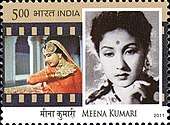
The day Meena Kumari died, her 1952 film Baiju Bawra was re-released at Bombay's Super cinema, drawing house full audiences, which wept copiously remembering the actress.[72]
Shortly after her death, fellow actress Nargis wrote a personal essay in an Urdu magazine – Shama, entitled "Meena – Maut Mubarak Ho" (English: Congratulations on your death Meena). In October 1973, she also established the Meena Kumari Memorial for the Blind in her memory and was the chairman of this trust.[73]
In 1979, Meena Kumari Ki Amar Kahaani (English: The immortal story of Meena Kumari), a film dedicated to the late actress was released. It was directed by Sohrab Modi and featured exclusive interviews of various film personalities such as Raj Kapoor and Rajendra Kumar. The music for the film was composed by Khayyam. The following year, Shaira (alternatively titled Sahira) (English: Poetess) was released. It was a short documentary on Meena Kumari and was directed by S Sukh Dev along with Gulzar. This documentary was produced by Kanta Sukhdev.
A postal stamp of face value 500 paise was issued in her honour on 13 February 2011 by India Post.[74]

In May 2018, Ajeeb Dastaan Hai Yeh, a play depicting the life of Meena Kumari was staged at Rangayan auditorium of Jawahar Kala Kendra in Jaipur.[75]
On 1 August 2018, search engine Google commemorated Meena Kumari with a Doodle on her 85th birth anniversary.[76] Google commented: "Kumari captivated audiences with her beautiful, expressive eyes and portrayed strong yet vulnerable women who made their own way through life, often devastated by romance. Today, her screen appearances are studied for flawless moments and the complex emotions she could evoke without uttering a word".[77]
Biographies
- One of the first biographies of Meena Kumari was written just after her death by Vinod Mehta in October 1972. The official biography of Kumari, it was titled Meena Kumari – The Classic Biography. The biography was re-published in May 2013.
- Simply Scandalous authored by Mohan Deep was an unofficial biography published in 1998. It was serialized in Mumbai's Hindi daily Dopahar Ka Saamna.
- Another biography of Meena Kumari, Aakhri Adhai Din was written in Hindi by Madhup Sharma. The book was published in 2006.
In film
Meena Kumari has always been a subject of interest among present day filmmakers, thanks to her massive star appeal. In 2004, a modern-day adaption of her classic film Sahib Bibi Aur Ghulam was to be made by Pritish Nandy Communications in which Aishwarya Rai and later Priyanka Chopra[78] was to portray her role of Chhoti Bahu. However, the film got shelved and paved way for a TV series helmed by director Rituparno Ghosh in which actress Raveena Tandon essayed this role.[79]
In 2015, it was reported that Tigmanshu Dhulia was to make a film on Hindi cinema's Tragedy Queen, which was to be a screen adaptation of Vinod Mehta's book, "Meena Kumari – The Classic Biography".[80] Actress Kangana Ranaut was approached to portray Kumari but the film was shelved yet again due to lack of authentic facts and after strong protestion of Meena Kumari's stepson Tajdar Amrohi.
In 2017, director Karan Razdan also decided to direct an official biopic on her. For this, he approached Madhuri Dixit and Vidya Balan to play the Great Tragedienne but due to variety of reasons, both of them declined the offer. He later turned to actress Sunny Leone who showed great interest to essay her onscreen.[81] Various other actresses including Richa Chadha,[82] Jayaprada,[83] Janhvi Kapoor,[84] Karishma Sharma,[85] Anupriya Goenka[86] and Bhumi Pednekar[87] have also expressed their wish to play the legendary icon.
In 2018, Producer and former child artist Kutty Padmini announced to make a biopic on Meena Kumari in the form of a web series along with singer Mohammed Rafi and actor-director J.P. Chandrababu. Padmini has worked with Meena Kumari in the film Dil Ek Mandir and wishes to honour the late actress with this biopic.[88]
In October 2019, Sanjay Leela Bhansali announced the remake of Kumari's 1952 classic Baiju Bawra. The film is scheduled to release around Diwali of 2021.[89]
References
- Mehta 2016, p. 1916.
- Adrian Room (26 July 2010). "Meena Kumari". Dictionary of Pseudonyms: 13,000 Assumed Names and Their Origins. McFarland. p. 269. ISBN 978-0-7864-4373-4. Retrieved 22 April 2012.
- "Meena Kumari birth anniverary: She is inspiration for all!". Free Press Journal. Retrieved 3 October 2018.
- "Meena Kumari – Interview (1952)". Cineplot.com. 19 July 2017. Retrieved 29 July 2017.
- Mohamed, Khalid (25 March 2016). "Remembering the Tragedy Queen Meena Kumari". Khaleej Times.
- "Meena Kumari – "The Tragedy Queen of Indian Cinema"". Rolling Frames Film Society.
- Mehta 2016.
- "Filmfare Awards (1963)". IMDb.
- Nationalinfo (29 June 2016). "Meena Kumari". national info. Archived from the original on 16 August 2016. Retrieved 14 August 2016.
- "MEENA KUMARI: An Enigma". Songsofyore. 1 August 2017. Retrieved 19 August 2019.
- "Literary Notes: Meena Kumari, Pyare Lal Shakir Meruthi and journalism". Dawn. 25 February 2020. Retrieved 26 February 2020.
- "At The Edge: Meena Kumari: Her Death, Work, Love and Birth". At The Edge. Retrieved 19 August 2016.
- "Meena Kumari, the tragedy Queen – Rare Pictures and Unknown facts". Filmibeat.com. 10 January 2013. Retrieved 25 July 2016.
- "Flashback Meena Kumari". Indusladies.com. Retrieved 25 July 2016.
- "Muslim female icons of Bollywood". The Nation. 14 August 2016. Retrieved 14 August 2016.
- Ausaja, S M M. "Romancing The Reel". archive.tehelka.com. Anant Media Pvt. Ltd. Tehelka.com. Archived from the original on 4 December 2014. Retrieved 14 January 2015.
- Vinod Mehta (31 July 2013). "Meena Kumari". Retrieved 25 July 2016 – via Google Books.
- "She almost drowned during filming". Daily News and Analysis. 1 August 2018. Retrieved 7 August 2018.
- Kohli, Suresh (6 September 2012). "Daera (1953)". The Hindu. Retrieved 13 November 2016.
- Desai 2013.
- "Azaad". Archived from the original on 15 March 2007. Retrieved 7 March 2007.
- Vasudev, Aruna A.; Lenglet, Philippe (1983). "G. P. Sippy". Indian Cinema Superbazaar. Vikas. p. 297. ISBN 978-0-7069-2226-4. Retrieved 14 November 2015.
- Dwyer, Rachel (2002). Yash Chopra: Fifty Years in Indian Cinema. Lotus Collection. p. 42. ISBN 8174362347.
- "Top Earners 1957". Box Office India. Archived from the original on 18 September 2010. Retrieved 29 June 2010.
- Sampath, Janani (12 June 2013). "The South-Bollywood hero brigade". The New Indian Express. Retrieved 25 July 2016.
- Hameeduddin Mahmood (1974). The kaleidoscope of Indian cinema. Affiliated East-West Press. p. 213.
- The Illustrated Weekly of India. October 1988. p. 53.
- "Sahib Bibi Aur Ghulam 1962". The Hindu. 30 August 2008.
- Margaret Herrick Library, Academy of Motion Picture Arts and Sciences
- Saran, Sathya; Alvi, Abrar (28 July 2016). "Ten Years with Guru Dutt". Google Books. Retrieved 13 August 2016.
- Gulzar; Govind Nihalani; Saibal Chatterjee (2003). Encyclopaedia of Hindi cinema. Popular Prakashan. p. 335. ISBN 8179910660.
- "Blast from the past – Chitralekha (1964)". The Hindu. 16 June 2011.
- "The melodious music director – Roshan". Daily Times. 18 May 2011. Archived from the original on 28 May 2011.
- "Gazal (1964)". Hindi Geetmala.com. Retrieved 2 August 2019.
- Gazal at Bollywood Hungama
- "Box office 1965". Box Office India. Archived from the original on 14 October 2013. Retrieved 9 January 2012.
- "Phool Aur Patthar". Archived from the original on 14 October 2011. Retrieved 10 October 2011.
- "Majhli Didi". Archived from the original on 9 September 2011. Retrieved 9 September 2011.
- "Bahu Begum (1967)". The Hindu. 10 July 2009. Retrieved 20 May 2013.
- "Jawab (1970) – Bollywood MuVyz". Jawab (1970) | Hindi Movie Review, Songs, Trailer, Videos – Bollywood MuVyz. Retrieved 14 August 2016.
- "The Perfect Swansong". The Indian Express. 27 July 2014. Retrieved 25 July 2016.
- "MEENA KUMARI–THE SINGING MAESTRO". nikhileiyer. 1 April 2013. Retrieved 26 December 2016.
- "Journal : Jan 03, 2012 : Of One Soul – Meena Kumari". Truth Within, Shines Without. 14 January 2012. Retrieved 13 August 2016.
- "Why Nargis said 'Meena, Maut Mubarak Ho!'". The Times of India. 2 December 2018. Retrieved 2 December 2018.
- "Heartbreaking Story of Mahjabeen Bano (Meena Kumari)". Jhakaas Movies. 15 March 2017. Retrieved 2 December 2018.
- "I am alive because of Amitabh Bachchan". rediff. 30 October 2014. Retrieved 31 March 2019.
- S.S.N (30 March 2014). "In the name of the father". Dawn. Pakistan. Retrieved 13 August 2016.
- Melwani, Lavina (1 November 2015). "Meena Kumari – the Urdu Poetess You Didn't Know". Lassiwithlavina.com. Retrieved 25 July 2016.
- Iyengar, Shriram. "Meena Kumari, the poet". Cinestaan.com. Archived from the original on 25 August 2016. Retrieved 14 August 2016.
- "Meena Kumari I Write I Recite 2392 003 LP Vinyl Record Singer Meena Kumari Music Khayyam Lyrics Meena Kumari". Onlinevinylshop.com. Archived from the original on 11 September 2016. Retrieved 25 July 2016.
- Chandel, Rajani. "Khayyam has composed for actress Meena Kumari's poems". The Times of India. Retrieved 25 July 2016.
- "Urdu Books of Meena Kumari". Rekhta.org. Retrieved 25 July 2016.
- "The truth behind Pakeezah unveiled..." filmfare.com. 8 June 2017. Retrieved 29 July 2017.
- "Meena Kumari: The star performer as tragedy queen". Sunday Guardian Live. 9 June 2018. Retrieved 4 July 2018.
- Kahlon, Sukhpreet (1 August 2017). "'Meena Kumari used to wear her roles like a dress' Birth anniversary special". Cinestaan.com. Retrieved 1 August 2017.
- "Ashok Kumar on Meena Kumari". Cineplot. 25 May 2011. Retrieved 2 August 2019.
- "DREAM HOUSE (1953)". BFI. 10 February 2017. Retrieved 15 January 2018.
- "My Father Never Divorced Meena Kumari: Tajdar Amrohi". skjbollywoodnews.com. 31 March 2018. Retrieved 31 March 2018.
- "Total Recall Meena Kumari Part 3". 8 December 2011. Retrieved 2 August 2019 – via YouTube.
- "Meena Kumari's films to be screened at Osianama at Liberty". Pinkvilla. 24 February 2016. Retrieved 14 August 2016.
- "Bollywood Fashion Through The Ages". The Indian Express. 14 October 2016. Retrieved 2 August 2019.
- "Meena Kumari Biography by Javed Akhtar". 3 September 2016. Event occurs at 32:00. Retrieved 1 August 2019 – via YouTube.
- "Meena Kumari gives fashion goals even today; see pics". The Indian Express. 1 August 2019. Retrieved 1 August 2019.
- Poorvi (31 March 2016). "On her death anniversary: Celebrating Meena Kumari's life". SheThePeople TV. Retrieved 14 August 2016.
- "83rd birth anniversary of Meena Kumari: Life story of the 'tragic queen' of Bollywood". News18. 1 August 2015. Retrieved 14 August 2016.
- "Meena Kumari the melancholic queen of cinema! – Sun Post". Sunpost.in. Retrieved 25 July 2016.
- "Meena Kumari Made Raaj Kumar Forget His Dialogues". 13 August 2018. Retrieved 19 August 2018 – via YouTube.
- admin (16 April 2016). "Madhubala – Her Sister's Recollections". Cineplot.com. Retrieved 19 August 2016.
- Franco, Carlo (25 June 2017). "Amitabh Bachchan's Official Blog". Amitabh Bachchan's Official Blog. Retrieved 20 August 2017.
- Rumi, Raza (31 October 2014). "Meena Kumari, the poet". The Friday Times. Retrieved 2 August 2019.
- "Celebrating 40 Years of Pakeezah". Rediff.com. Retrieved 25 July 2016.
- "Remembering the Tragedy Queen Meena Kumari".
- "Nargis paying tribute to Meena Kumari (October 1973)". Cineplot. 6 October 2012. Retrieved 7 August 2018.
- "India Post releases stamps on six legendary actresses". Sify. 14 February 2011. Retrieved 14 August 2016.
- "When Meena Kumari comes alive on Jaipur stage". The Times of India. 13 May 2018. Retrieved 13 May 2018.
- "Meena Kumari, Tragedy Queen, remembered by Google Doodle on 85th birth anniversary". The Indian Express. 1 August 2018. Retrieved 1 August 2018.
- "Meena Kumari's 85th Birthday". Google. 1 August 2018. Retrieved 3 August 2018.
- "Priyanka might play chhoti bahu!". rediff. 28 March 2005. Retrieved 17 March 2018.
- "I am taking to television as a challenge". IndianTelevision. 28 August 2003. Retrieved 5 March 2018.
- "Meena Kumari back on screen". Mumbai Mirror. 5 March 2015. Retrieved 5 March 2015.
- "Sunny Leone to essay legendary actress Meena Kumari in her biopic!". IndiaTV. 15 December 2017. Retrieved 5 March 2018.
- "Richa Chadha's bucket list: 3 characters she'd like to play on screen". t2online. 14 April 2018. Retrieved 14 April 2018.
- "Jaya Prada tells us why she becomes Meena Kumari". Dainik Jagran. 23 August 2018. Retrieved 24 August 2018.
- "Janhvi Kapoor would love to play Meena Kumari or Madhubala". The Indian Express. 14 July 2018. Retrieved 14 July 2018.
- "Karishma Sharma: I want to play Mata Hari or Meena Kumari". nationalherald. 21 July 2019. Retrieved 24 July 2019.
- "With life as her teacher, Anupriya masters the act". Hindustan Times. 15 October 2019. Retrieved 5 November 2019.
- "Bhopal: Bhumi Pednekar inaugurates Waste-to-Art selfie point". Free Press Journal. 2 March 2020. Retrieved 2 March 2020.
- "Biopics become the new flavour of web series". The Times of India. 11 September 2018. Retrieved 11 September 2018.
- "Sanjay Leela Bhansali Announces His Next Most Ambitious Magnum Opus Project Baiju Bawra!". The Times of India. 27 October 2019. Retrieved 2 November 2019.
Bibliography
- Ghosh, Avijit (2013). 40 RETAKES. Westland. ISBN 978-93-83260-31-7.CS1 maint: ref=harv (link)
- Mehta, Vinod (2016). Meena Kumari: The Classic Biography. HarperCollins Publishers India. ISBN 9789350296271.CS1 maint: ref=harv (link)
- Desai, Meghnad (2013). Pakeezah. HarperCollins Publishers India. ISBN 978-93-5116-023-6.CS1 maint: ref=harv (link)
External links
- Meena Kumari on IMDb

- Meena Kumari at Manas: Culture of India
- Collection of verses by Meena Kumari